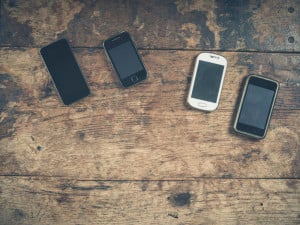Poor people shouldn’t eat steak or fish.
Poor people shouldn’t watch TV!
Why do all these homeless people have cell phones?
Sound familiar?
Despite the fact that we live in a country burdened by poverty and social immobility, we also live in a country riddled with false narratives about what poverty looks like and doesn’t look like, or what kind of poverty is valid or invalid.
We live in a country where legislators believe it’s fair to ban poor people from eating junk food, simply because they feel entitled to define what poor people should and shouldn’t do.
We live in a country where people feel comfortable judging the homeless for having iPhones and the lower-class for having televisions and refrigerators, despite the fact that most of us who are not homeless or lower-class use our own phones and appliances and televisions on a daily basis.
This is the real reason we can’t have nice things: Because our culture tells us that only certain people should have certain things.
The myth that poor people shouldn’t, and can’t, have “nice things” – and that having those things invalidates their experiences – is all around us.
It’s deeply ingrained in us that there are only two very polarized ways to exist: to be comfortable or to have absolutely nothing.
Having anything deemed a “luxury” disqualifies you from talking about poverty, or relying on social support, or asking for help – even if those so-called “luxuries” are necessities like kitchen appliances for making and preserving and storing food, mobile technologies that enable us to stay afloat in the modern world, and apparel that makes everyone else a little more comfortable about our situation.
And that’s bullshit.
The longer we force people to suffer as much as possible before we help them, the worse off we all are.
And the longer we sit around pretending poverty only looks like one set of circumstances, the harder it’s going to be to really get down to business and end it once and for all.
When we deny things of poor people based in the idea that poor people “don’t deserve” those things, just by virtue of their financial situation, we’re perpetuating classism. Our income, our savings, our credit lines – those are not sums of our worth.
When we refuse to empathize and trust in people’s stories, when we refuse to allow the poor to ask for help or call themselves as such, we perpetuate a status quo that makes the actual suffering of poor people invisible and worthless.
And when we do that, we hurt everyone who isn’t swimming in pools full of hundred dollar bills.
When we tell poor people they can’t be poor and own a cell phone, we invalidate the stories of thousands of low- and middle-class Americans who feel insecure about their finances.
When we tell poor people they shouldn’t be buying healthy food, or nice clothes, or renting their own apartments, or anything along those lines, we buy into a false dichotomy between rich and poor that does nothing but make most of us poorer.
These are three reasons why poor people can, and should, have nice things (besides, ya know, that it’s none of our business if they do).
1. Because People Need ‘Nice Things’ to Advance, Survive, and Thrive
I use my cell phone to do my job, or at least I have for the past few years. I use it to communicate with my editors and employers via e-mail and via virtual workplace apps throughout the day, pretty much every day.
I use it to send tweets, post on Facebook, and edit Tumblr posts for different organizations. And at least once in a day, it’s made clear by the people who employ me that I’m expected to be available to them at the flip of a switch – or the push of a Home Button.
Cell phones aren’t luxuries. I mean, sure, they cost a pretty penny. But having a smartphone is basically required of many of us at this point in order to thrive in the modern world.
And that’s why it makes sense that homeless folks and poor folks would do what they can to have one. A smart phone gives them a world of information at the touch of a button, and it puts new opportunities for shelter, employment, and support at their fingertips.
It’s a method of survival.
But I’m not here to argue that the poor should only be entitled to things they can justify buying by saying they need them to live. Surviving and thriving are two different things, and I believe firmly that the poor are entitled to do both.
Poor people deserve “basics,” and stuff that helps them run their lives the same way we expect to be able to run ours.
But they also deserve the things so many of us have that we take for granted: connections, a feeling of self-worth, a moment to relax or take care of ourselves.
Sure, a smartphone could change a homeless woman’s life. It could help her land a job, or otherwise get back on her feet or to a safe space.
But it could also just be a tool for helping her keep in touch with her family. It could also be a place where she stores music that helps her get through the night.
And yes, a struggling family might eat fish or cuts of beef for dinner because that meal provides them with vital nutrients. But it also just may be their favorite, or a meal they make to entertain friends.
People need “nice things” to keep up in the modern world. Or maybe people need them to feel good. Or maybe people need them to practice self-care.
Or maybe they need them because life is too damn hard to make it through by sacrificing every single possible thing that makes it a little better.
Having those nice things doesn’t change the realities of their lives. They just, in some way, might make those realities a little more survivable, or liveable.
2. Because We’d Judge Them Just as Harshly If They Didn’t Have Them
Many people in our society seem awfully distressed about the idea of poor people masquerading as “normal people” – as someone like them, as someone who looks right, or has the right possessions, or went to the right schools. (Or owns a goddamn refrigerator.)
And yet, the argument that poor people are only entitled to, or deserving of, certain things most of us feel welcome to own in abundance or even waste in similar abundance is not only hypocritical, but it’s also a logical trap.
It’s a Catch-22: We don’t want poor people to have nice things, but we also live in a society where having those things gives you a certain social value.
Basically, the poor are damned if they do and damned if they don’t.
We wouldn’t hire a poor person who didn’t look the part at their job interview, or a homeless person who didn’t have a phone number or e-mail address we could reach them at.
The government takes children away from parents who can’t meet certain standards of living that come with a high price tag.
And when poor people are also people of size, or sick or disabled, people are quick to pin it on their “poor choices” – rather than acknowledging how classist infrastructure robs people of the opportunity to have sustainable foods, affordable community health resources, and community centers/parks with exercise equipments and activities.
The bottom line is that the “nice things” we deny the poor are things we don’t actually consider or treat as luxuries in our own lives.
There are things that society tells us we need – and for the poor, not having them is just as shameful as “indulging” in them.
We judge the poor – openly and egregiously – for not living their lives on our terms. For making decisions we don’t think were right, or justified. For refusing to fit into our boxes.
We judge them for dreaming of having a better life and having the audacity to push and hustle for it.
But in actuality, having “nice things” is sometimes just another survival mechanism for poor people living in our consumerist, technology-saturated world.
3. Because We Don’t Know What They Gave Up in Order to Have Them
It’s easy for us to look in on other people’s lives and see a distorted image, especially on the Internet or in social settings. And when we see poor people with “nice things,” it’s important to remember that we aren’t seeing the whole picture of their lives.
There is no one “poverty narrative.” There is no one type of poor person.
There is no one consistent set of experiences that apply to poor people – no matter what our classist culture tells us.
To assume otherwise is to distort the truth.
Legislators insist that people on food stamps are living too large for their position; real-life tales of what it’s like to be on food stamps suggest otherwise.
People who demand that poor people give up their attachments and personal belongings before asking for help demonstrate nothing by their actions instead of their utter ignorance about what it’s like to actually be poor.
We don’t know poor people’s lives. We don’t know where they come from, who they are, or what their lives are like.
When it comes to the “nice things” poor people have, we often don’t take the time to consider how they got them – and, more specifically, what they might have given up to have them.
A homeless man may have given up a few nights at a shelter to put a down payment on that smart phone and its corresponding contract.
A poor mother may have worked extra shifts, or sold some of her most valuable possessions, in order to help her family get a new appliance for the house.
A man on food stamps may have made that cut of meat last through two weeks of meals.
I had a brand-spankin’-new computer going into college. It was nicer than a lot of other people’s laptops, and I cherished it because it helped me blend in a little more. I came from a working-class, single-mom household and went to a college packed with middle- and upper-class kids.
But I got that computer because I worked hard and got a scholarship that let me pay for it, not because my life had been handed to me on a silver platter.
And this year, I bought a car. Not because I was rolling in money, but because I planned for a few years on how to save up enough to make it possible, and I went without other indulgences in order to make it so.
When it comes to “nice things,” the biggest difference between poor people and the rest of our culture just might be how hard they worked to have those things in the first place.
And it’s impossible for us to ever know the true story behind their laptops, refrigerators, smart phones, and work clothes just by looking at them.
I’m not saying I’m perfect when it comes to this. If I saw someone with a new car roll up to my house, I’d probably assume they were accustomed to a certain middle- or upper-class lifestyle.
When someone I’m meeting up with at a coffee shop takes out a MacBook Pro that’s in mint condition, I usually assume they didn’t wince like I did when they saw the price tag.
Every single person has a different set of priorities, needs, and desires. When we judge the poor at face value for their choices as consumers, or invalidate their experiences based on their property, we’re not taking the time to consider their motivations and we’re essentially implying that we don’t trust they can make the right decisions for their own lives.
We don’t know how poor people got to the point of buying “nice things,” or how they got them otherwise. So we should stop worrying about whether or not they end up with them.
***
I think we all deserve “nice things.”
We all deserve clothes and shelter and food. We all deserve to eat healthy and do right by our bodies and have the resources and opportunities to unwind, to do fulfilling work, to feel at home.
And I know that can be confusing, or frustrating, in practice.
We all work hard. We all want things we can’t have, or know we shouldn’t buy. We all dream of a world in which we feel like we’re able to live our dream lives in our dream homes, and we all, at times, feel like we’re the worst-off people in the world.
I know that it’s easy to be frustrated when someone we know who’s in hard straits also seems to be reckless with their spending. I know it can be confusing to see people – even people like me – write about poverty, labor, and class issues from a Macbook Pro.
But poor people, just like the rest of us, make choices. Hard choices. Choices about what to spend and when and for what. Choices that impact their daily lives, their opportunities, even their futures.
And when push comes to shove, we don’t know shit about their lives. And we should know better than to try and define them — or invalidate them.
[do_widget id=’text-101′]
Carmen Rios is a Contributing Writer for Everyday Feminism. She splits her time disparately between feminist rabble-rousing, writing, public speaking, and flower-picking. A professional feminist by day and overemotional writer by night, Carmen is currently Communications Coordinator at the Feminist Majority Foundation and the Feminism and Community Editor at Autostraddle. You can follow her on Twitter @carmenriosss and Tumblr to learn more about her feelings.
Search our 3000+ articles!
Read our articles about:
Our online racial justice training
Used by hundreds of universities, non-profits, and businesses.
Click to learn more




















